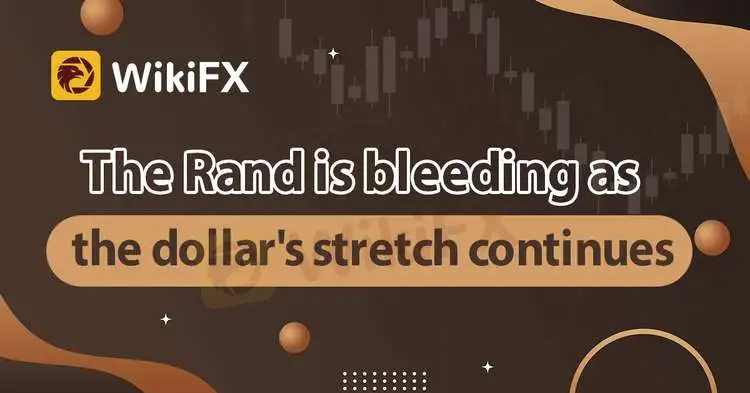简体中文
繁體中文
English
Pусский
日本語
ภาษาไทย
Tiếng Việt
Bahasa Indonesia
Español
हिन्दी
Filippiiniläinen
Français
Deutsch
Português
Türkçe
한국어
العربية
The Rand is bleeding as the dollar's stretch continues.
Abstract:The rand remains weak versus the dollar, which is strengthening due to fears about slowing global economic growth, increasing interest rates, and conflict threats, resulting in greater market volatility.

The rand remains weak versus the dollar, which is strengthening due to fears about slowing global economic growth, increasing interest rates, and conflict threats, resulting in greater market volatility.
According to Bloomberg, the dollar surged against all of its key counterparts as China's Covid lockdowns, increasing inflation, and a weakening global growth outlook bolstered demand for the currency as a safe haven.
“Surging inflation, the crisis in Ukraine, and tougher lockdowns against Covid-19 in Beijing and Shanghai have left investors nervous on numerous fronts,” Reuters said. The dollar climbed the most against risky currencies, such as the rand.
Investors are leaving US Treasuries and “flocking to the currency market and buying the US dollar” as the Federal Reserve raises interest rates aggressively, according to Matt Maley, chief market analyst at Miller Tabak & Co.
“Given the situation in Ukraine and China's healthcare issues, it's not surprising that the dollar has become an even stronger magnet than normal during difficult times.”
Following the Fed rate announcement in the middle of last week, the South African rand battled its way back against the greenback, hitting as high as R15.43 per dollar. However, by Monday morning, the local currency had reached the following values versus the main currencies:
· Dollar/Rand: R16.13 (0.71%)
· Pound/Rand: R19.84 (0.38%)
· Euro/Rand: R16.97 (0.38%)
“Markets are jittery to begin the week. ”Ongoing Chinese lockdowns, the Ukraine crisis, and growing inflation continue to be sources of concern, said Bianca Botes, director at Citadel Global.Gold is still under pressure from the strong dollar, while oil prices are being held back by a slowdown in Chinese demand, she added. The big release for this week, according to Citadel Global, is US inflation, which is coming on Wednesday. We'll be watching the local SACCI business confidence data today.
“The rand is on thin ice,” Botes added. While the rand has dropped significantly in recent weeks, Absa feels it is still cheap. According to the financial services firm, the rand would rebound to R15.25 versus the dollar by mid-year before steadily sliding to R15.75 by year's end. Bloomberg said that oil was hovering around $110 per barrel. Crude is being buffeted by supply threats associated to Russia's war in Ukraine, as well as demand from China's breakout.

Disclaimer:
The views in this article only represent the author's personal views, and do not constitute investment advice on this platform. This platform does not guarantee the accuracy, completeness and timeliness of the information in the article, and will not be liable for any loss caused by the use of or reliance on the information in the article.
Related broker
Read more

Top 10 Trading Indicators Every Forex Trader Should Know
Master the top 10 Forex trading indicators to analyze real-time Forex quotes, trends, and market signals. Learn strategies to boost accuracy and avoid mistakes.

Geopolitical Events: What They Are & Their Impact?
You've heard many times that geopolitical events have a significant impact on the Forex market. But do you know what geopolitical events are and how they affect the FX market? Let us learn about it today.

Why Do You Feel Scared During Trade Execution?
Trade execution is a pivotal moment for traders. It is when analysis turns into action, and potential profits or losses become reality. However, for many traders, this moment is accompanied by fear. Why does this happen, and how can you address it?

WikiEXPO Global Expert Interview: Simone Martin—— Exploring Financial Regulation Change
In the midst of financial innovation and regulation, WikiGlobal, the organizer of WikiEXPO, stays abreast of industry trends and conducts a series of insightful and distinctive interviews on pivotal topics. We are delighted to have the privilege of inviting Simone Martin for an in-depth conversation this time.
WikiFX Broker
Latest News
Geopolitical Events: What They Are & Their Impact?
Volkswagen agrees deal to avoid Germany plant closures
Top 10 Trading Indicators Every Forex Trader Should Know
WikiEXPO Global Expert Interview: Simone Martin—— Exploring Financial Regulation Change
TradingView Launches Liquidity Analysis Tool DEX Screener
MultiBank Group Wins Big at Traders Fair Hong Kong 2024
'Young investors make investment decisions impulsively to keep up with current trends' FCA Reveals
Why Do You Feel Scared During Trade Execution?
CySEC Settles Compliance Case with Fxview Operator Charlgate Ltd
Malaysian Influencer Detained in Taiwan Over Alleged Role in Fraud Scheme
Currency Calculator


